Discussion: Stress Factors, Mitigation in Nursing Students, Ireland
VerifiedAdded on 2021/06/18
|7
|1468
|276
Discussion Board Post
AI Summary
This discussion paper analyzes the stress experienced by nursing students, particularly international students, in Ireland. It identifies key stress-inducing factors, including academic pressures, cultural differences, and financial constraints. The paper explores various stress mitigation strategies adopted by students, such as seeking religious support, part-time employment, and building social connections, while also highlighting the limited support provided by universities. The implications of the research emphasize the need for revised education policies and the implementation of counseling services to address student stress. The discussion concludes by suggesting further research avenues, including quantitative analysis and intervention studies to develop effective stress-reducing strategies. The paper underscores the importance of understanding and addressing student stress to enhance their well-being and academic performance.
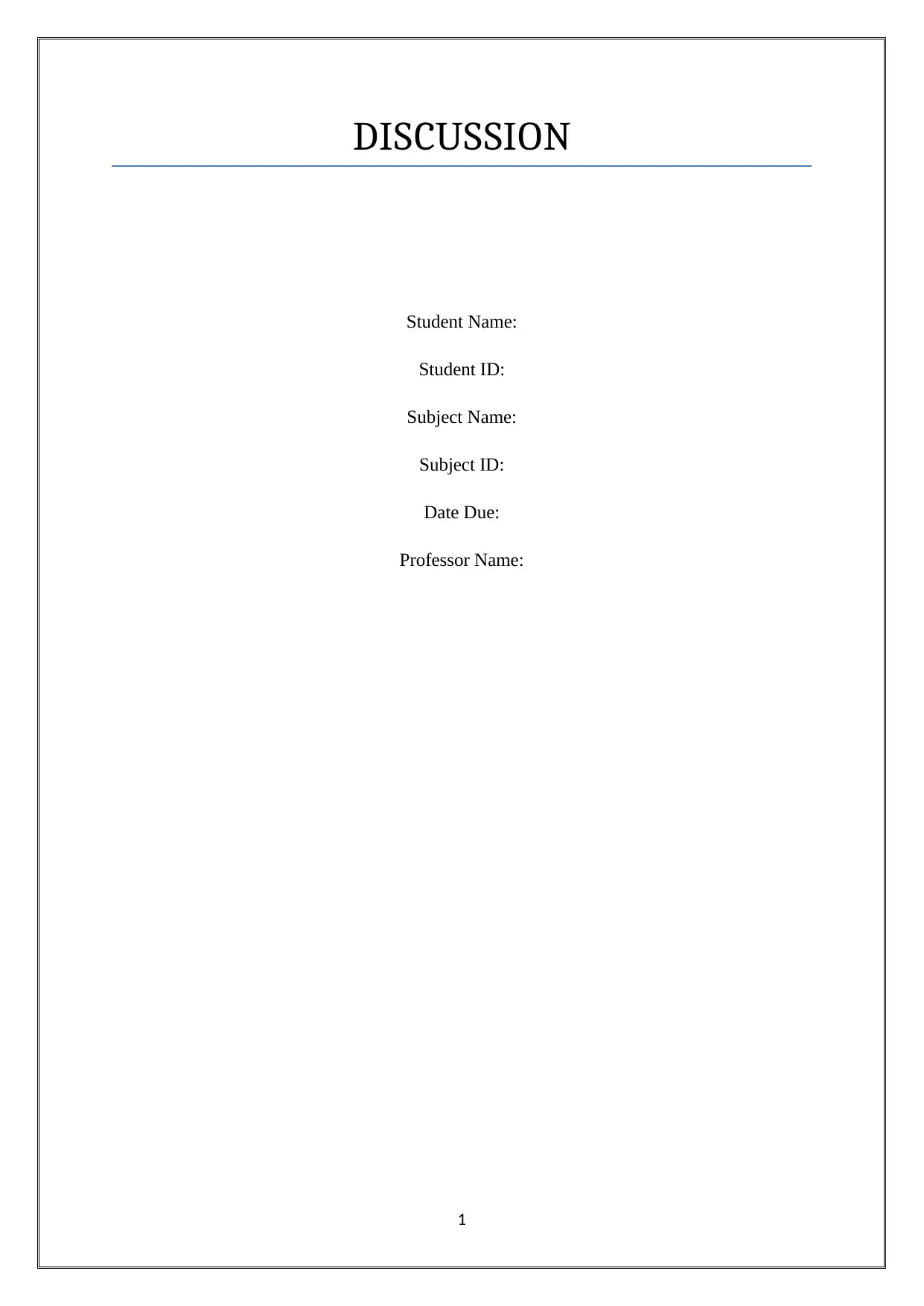
DISCUSSION
Student Name:
Student ID:
Subject Name:
Subject ID:
Date Due:
Professor Name:
1
Student Name:
Student ID:
Subject Name:
Subject ID:
Date Due:
Professor Name:
1
Paraphrase This Document
Need a fresh take? Get an instant paraphrase of this document with our AI Paraphraser
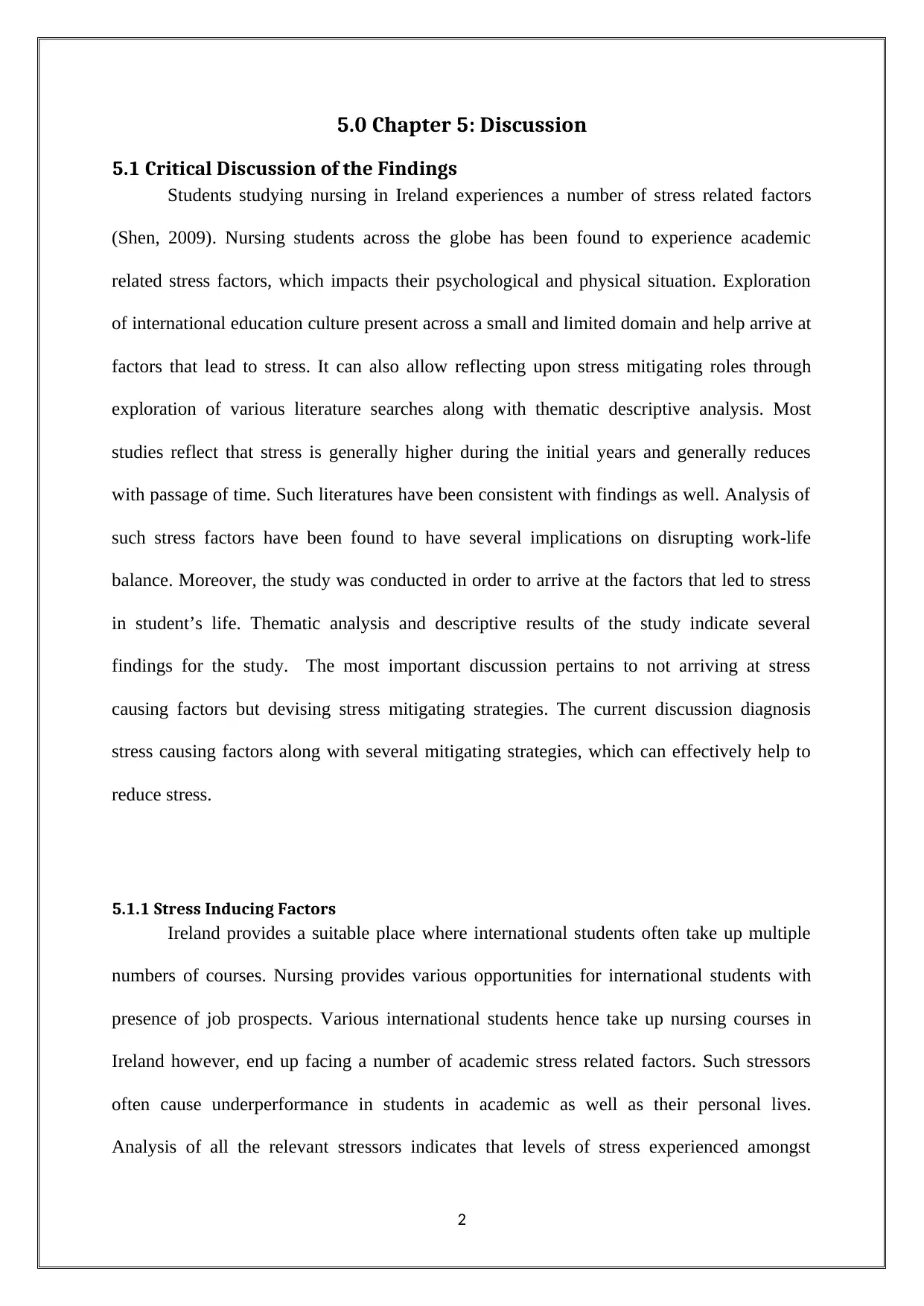
5.0 Chapter 5: Discussion
5.1 Critical Discussion of the Findings
Students studying nursing in Ireland experiences a number of stress related factors
(Shen, 2009). Nursing students across the globe has been found to experience academic
related stress factors, which impacts their psychological and physical situation. Exploration
of international education culture present across a small and limited domain and help arrive at
factors that lead to stress. It can also allow reflecting upon stress mitigating roles through
exploration of various literature searches along with thematic descriptive analysis. Most
studies reflect that stress is generally higher during the initial years and generally reduces
with passage of time. Such literatures have been consistent with findings as well. Analysis of
such stress factors have been found to have several implications on disrupting work-life
balance. Moreover, the study was conducted in order to arrive at the factors that led to stress
in student’s life. Thematic analysis and descriptive results of the study indicate several
findings for the study. The most important discussion pertains to not arriving at stress
causing factors but devising stress mitigating strategies. The current discussion diagnosis
stress causing factors along with several mitigating strategies, which can effectively help to
reduce stress.
5.1.1 Stress Inducing Factors
Ireland provides a suitable place where international students often take up multiple
numbers of courses. Nursing provides various opportunities for international students with
presence of job prospects. Various international students hence take up nursing courses in
Ireland however, end up facing a number of academic stress related factors. Such stressors
often cause underperformance in students in academic as well as their personal lives.
Analysis of all the relevant stressors indicates that levels of stress experienced amongst
2
5.1 Critical Discussion of the Findings
Students studying nursing in Ireland experiences a number of stress related factors
(Shen, 2009). Nursing students across the globe has been found to experience academic
related stress factors, which impacts their psychological and physical situation. Exploration
of international education culture present across a small and limited domain and help arrive at
factors that lead to stress. It can also allow reflecting upon stress mitigating roles through
exploration of various literature searches along with thematic descriptive analysis. Most
studies reflect that stress is generally higher during the initial years and generally reduces
with passage of time. Such literatures have been consistent with findings as well. Analysis of
such stress factors have been found to have several implications on disrupting work-life
balance. Moreover, the study was conducted in order to arrive at the factors that led to stress
in student’s life. Thematic analysis and descriptive results of the study indicate several
findings for the study. The most important discussion pertains to not arriving at stress
causing factors but devising stress mitigating strategies. The current discussion diagnosis
stress causing factors along with several mitigating strategies, which can effectively help to
reduce stress.
5.1.1 Stress Inducing Factors
Ireland provides a suitable place where international students often take up multiple
numbers of courses. Nursing provides various opportunities for international students with
presence of job prospects. Various international students hence take up nursing courses in
Ireland however, end up facing a number of academic stress related factors. Such stressors
often cause underperformance in students in academic as well as their personal lives.
Analysis of all the relevant stressors indicates that levels of stress experienced amongst
2
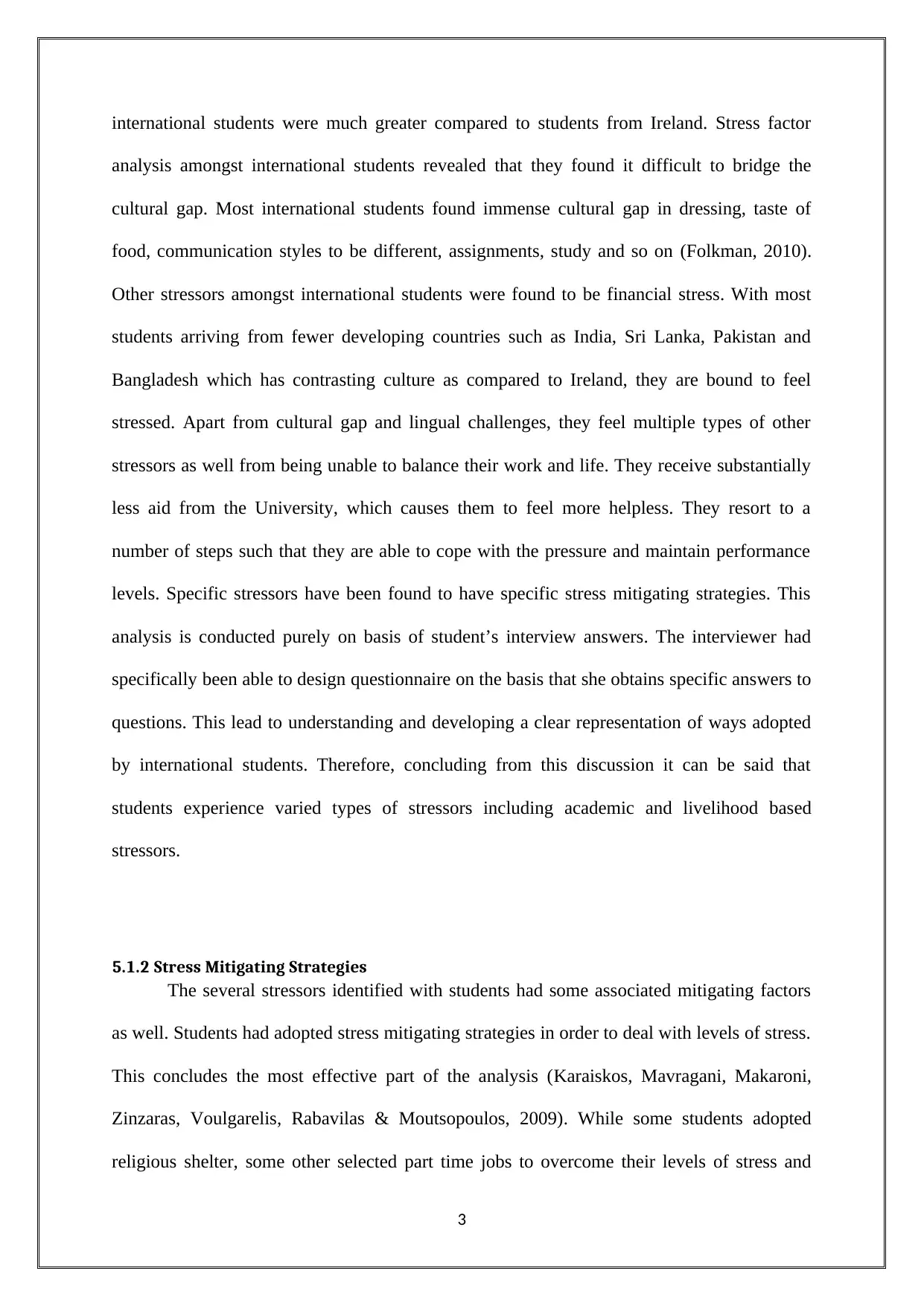
international students were much greater compared to students from Ireland. Stress factor
analysis amongst international students revealed that they found it difficult to bridge the
cultural gap. Most international students found immense cultural gap in dressing, taste of
food, communication styles to be different, assignments, study and so on (Folkman, 2010).
Other stressors amongst international students were found to be financial stress. With most
students arriving from fewer developing countries such as India, Sri Lanka, Pakistan and
Bangladesh which has contrasting culture as compared to Ireland, they are bound to feel
stressed. Apart from cultural gap and lingual challenges, they feel multiple types of other
stressors as well from being unable to balance their work and life. They receive substantially
less aid from the University, which causes them to feel more helpless. They resort to a
number of steps such that they are able to cope with the pressure and maintain performance
levels. Specific stressors have been found to have specific stress mitigating strategies. This
analysis is conducted purely on basis of student’s interview answers. The interviewer had
specifically been able to design questionnaire on the basis that she obtains specific answers to
questions. This lead to understanding and developing a clear representation of ways adopted
by international students. Therefore, concluding from this discussion it can be said that
students experience varied types of stressors including academic and livelihood based
stressors.
5.1.2 Stress Mitigating Strategies
The several stressors identified with students had some associated mitigating factors
as well. Students had adopted stress mitigating strategies in order to deal with levels of stress.
This concludes the most effective part of the analysis (Karaiskos, Mavragani, Makaroni,
Zinzaras, Voulgarelis, Rabavilas & Moutsopoulos, 2009). While some students adopted
religious shelter, some other selected part time jobs to overcome their levels of stress and
3
analysis amongst international students revealed that they found it difficult to bridge the
cultural gap. Most international students found immense cultural gap in dressing, taste of
food, communication styles to be different, assignments, study and so on (Folkman, 2010).
Other stressors amongst international students were found to be financial stress. With most
students arriving from fewer developing countries such as India, Sri Lanka, Pakistan and
Bangladesh which has contrasting culture as compared to Ireland, they are bound to feel
stressed. Apart from cultural gap and lingual challenges, they feel multiple types of other
stressors as well from being unable to balance their work and life. They receive substantially
less aid from the University, which causes them to feel more helpless. They resort to a
number of steps such that they are able to cope with the pressure and maintain performance
levels. Specific stressors have been found to have specific stress mitigating strategies. This
analysis is conducted purely on basis of student’s interview answers. The interviewer had
specifically been able to design questionnaire on the basis that she obtains specific answers to
questions. This lead to understanding and developing a clear representation of ways adopted
by international students. Therefore, concluding from this discussion it can be said that
students experience varied types of stressors including academic and livelihood based
stressors.
5.1.2 Stress Mitigating Strategies
The several stressors identified with students had some associated mitigating factors
as well. Students had adopted stress mitigating strategies in order to deal with levels of stress.
This concludes the most effective part of the analysis (Karaiskos, Mavragani, Makaroni,
Zinzaras, Voulgarelis, Rabavilas & Moutsopoulos, 2009). While some students adopted
religious shelter, some other selected part time jobs to overcome their levels of stress and
3
⊘ This is a preview!⊘
Do you want full access?
Subscribe today to unlock all pages.

Trusted by 1+ million students worldwide
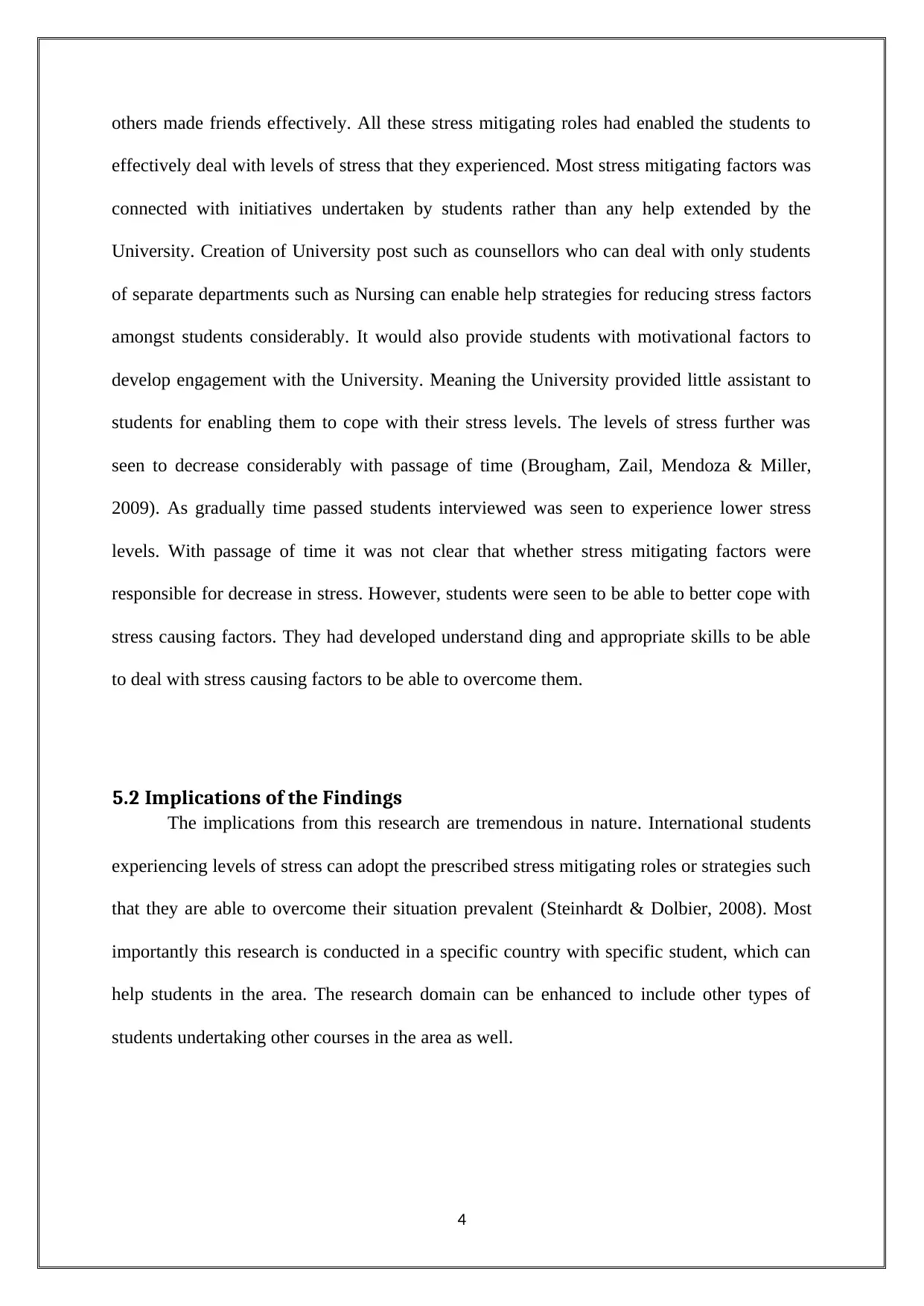
others made friends effectively. All these stress mitigating roles had enabled the students to
effectively deal with levels of stress that they experienced. Most stress mitigating factors was
connected with initiatives undertaken by students rather than any help extended by the
University. Creation of University post such as counsellors who can deal with only students
of separate departments such as Nursing can enable help strategies for reducing stress factors
amongst students considerably. It would also provide students with motivational factors to
develop engagement with the University. Meaning the University provided little assistant to
students for enabling them to cope with their stress levels. The levels of stress further was
seen to decrease considerably with passage of time (Brougham, Zail, Mendoza & Miller,
2009). As gradually time passed students interviewed was seen to experience lower stress
levels. With passage of time it was not clear that whether stress mitigating factors were
responsible for decrease in stress. However, students were seen to be able to better cope with
stress causing factors. They had developed understand ding and appropriate skills to be able
to deal with stress causing factors to be able to overcome them.
5.2 Implications of the Findings
The implications from this research are tremendous in nature. International students
experiencing levels of stress can adopt the prescribed stress mitigating roles or strategies such
that they are able to overcome their situation prevalent (Steinhardt & Dolbier, 2008). Most
importantly this research is conducted in a specific country with specific student, which can
help students in the area. The research domain can be enhanced to include other types of
students undertaking other courses in the area as well.
4
effectively deal with levels of stress that they experienced. Most stress mitigating factors was
connected with initiatives undertaken by students rather than any help extended by the
University. Creation of University post such as counsellors who can deal with only students
of separate departments such as Nursing can enable help strategies for reducing stress factors
amongst students considerably. It would also provide students with motivational factors to
develop engagement with the University. Meaning the University provided little assistant to
students for enabling them to cope with their stress levels. The levels of stress further was
seen to decrease considerably with passage of time (Brougham, Zail, Mendoza & Miller,
2009). As gradually time passed students interviewed was seen to experience lower stress
levels. With passage of time it was not clear that whether stress mitigating factors were
responsible for decrease in stress. However, students were seen to be able to better cope with
stress causing factors. They had developed understand ding and appropriate skills to be able
to deal with stress causing factors to be able to overcome them.
5.2 Implications of the Findings
The implications from this research are tremendous in nature. International students
experiencing levels of stress can adopt the prescribed stress mitigating roles or strategies such
that they are able to overcome their situation prevalent (Steinhardt & Dolbier, 2008). Most
importantly this research is conducted in a specific country with specific student, which can
help students in the area. The research domain can be enhanced to include other types of
students undertaking other courses in the area as well.
4
Paraphrase This Document
Need a fresh take? Get an instant paraphrase of this document with our AI Paraphraser
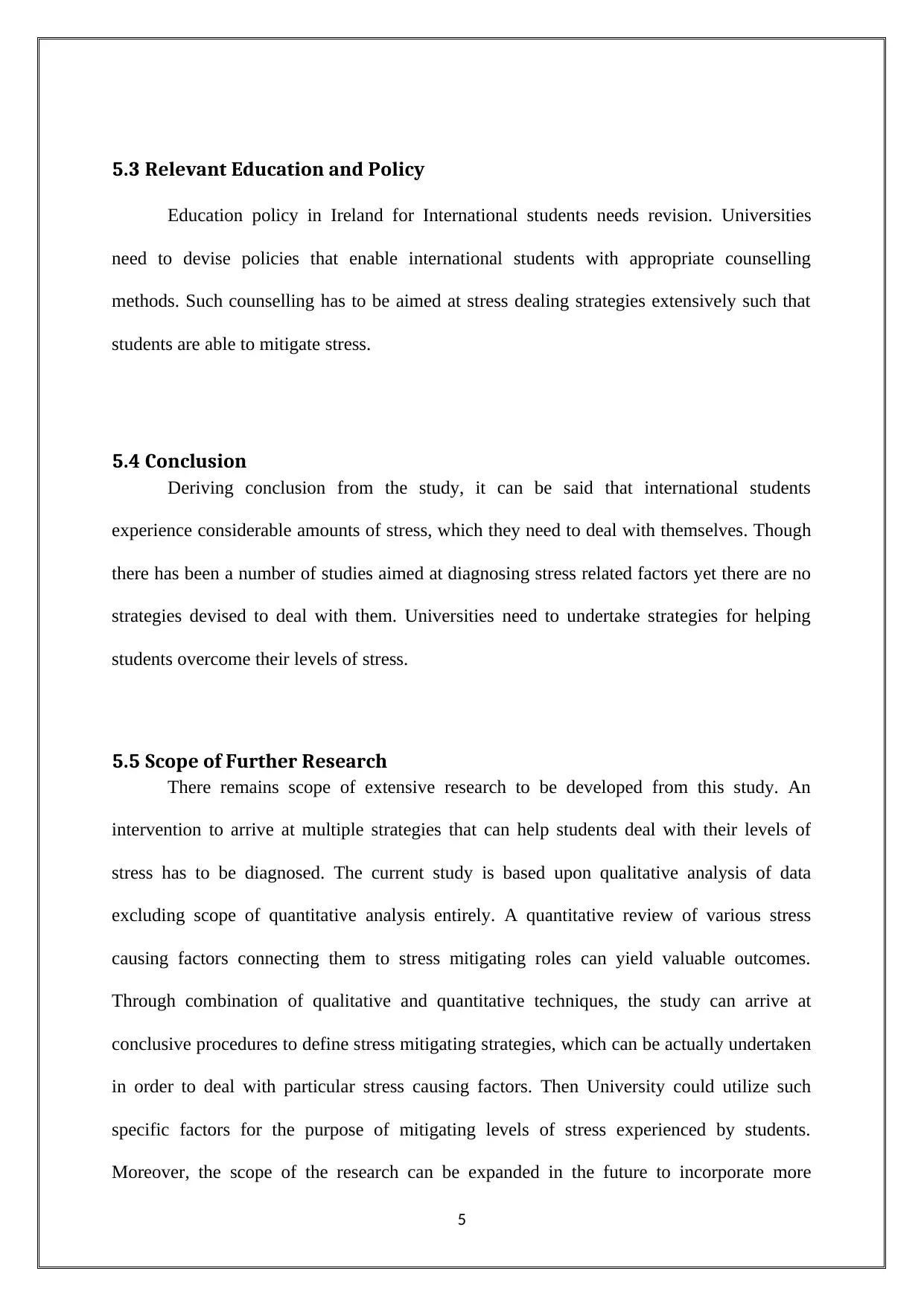
5.3 Relevant Education and Policy
Education policy in Ireland for International students needs revision. Universities
need to devise policies that enable international students with appropriate counselling
methods. Such counselling has to be aimed at stress dealing strategies extensively such that
students are able to mitigate stress.
5.4 Conclusion
Deriving conclusion from the study, it can be said that international students
experience considerable amounts of stress, which they need to deal with themselves. Though
there has been a number of studies aimed at diagnosing stress related factors yet there are no
strategies devised to deal with them. Universities need to undertake strategies for helping
students overcome their levels of stress.
5.5 Scope of Further Research
There remains scope of extensive research to be developed from this study. An
intervention to arrive at multiple strategies that can help students deal with their levels of
stress has to be diagnosed. The current study is based upon qualitative analysis of data
excluding scope of quantitative analysis entirely. A quantitative review of various stress
causing factors connecting them to stress mitigating roles can yield valuable outcomes.
Through combination of qualitative and quantitative techniques, the study can arrive at
conclusive procedures to define stress mitigating strategies, which can be actually undertaken
in order to deal with particular stress causing factors. Then University could utilize such
specific factors for the purpose of mitigating levels of stress experienced by students.
Moreover, the scope of the research can be expanded in the future to incorporate more
5
Education policy in Ireland for International students needs revision. Universities
need to devise policies that enable international students with appropriate counselling
methods. Such counselling has to be aimed at stress dealing strategies extensively such that
students are able to mitigate stress.
5.4 Conclusion
Deriving conclusion from the study, it can be said that international students
experience considerable amounts of stress, which they need to deal with themselves. Though
there has been a number of studies aimed at diagnosing stress related factors yet there are no
strategies devised to deal with them. Universities need to undertake strategies for helping
students overcome their levels of stress.
5.5 Scope of Further Research
There remains scope of extensive research to be developed from this study. An
intervention to arrive at multiple strategies that can help students deal with their levels of
stress has to be diagnosed. The current study is based upon qualitative analysis of data
excluding scope of quantitative analysis entirely. A quantitative review of various stress
causing factors connecting them to stress mitigating roles can yield valuable outcomes.
Through combination of qualitative and quantitative techniques, the study can arrive at
conclusive procedures to define stress mitigating strategies, which can be actually undertaken
in order to deal with particular stress causing factors. Then University could utilize such
specific factors for the purpose of mitigating levels of stress experienced by students.
Moreover, the scope of the research can be expanded in the future to incorporate more
5
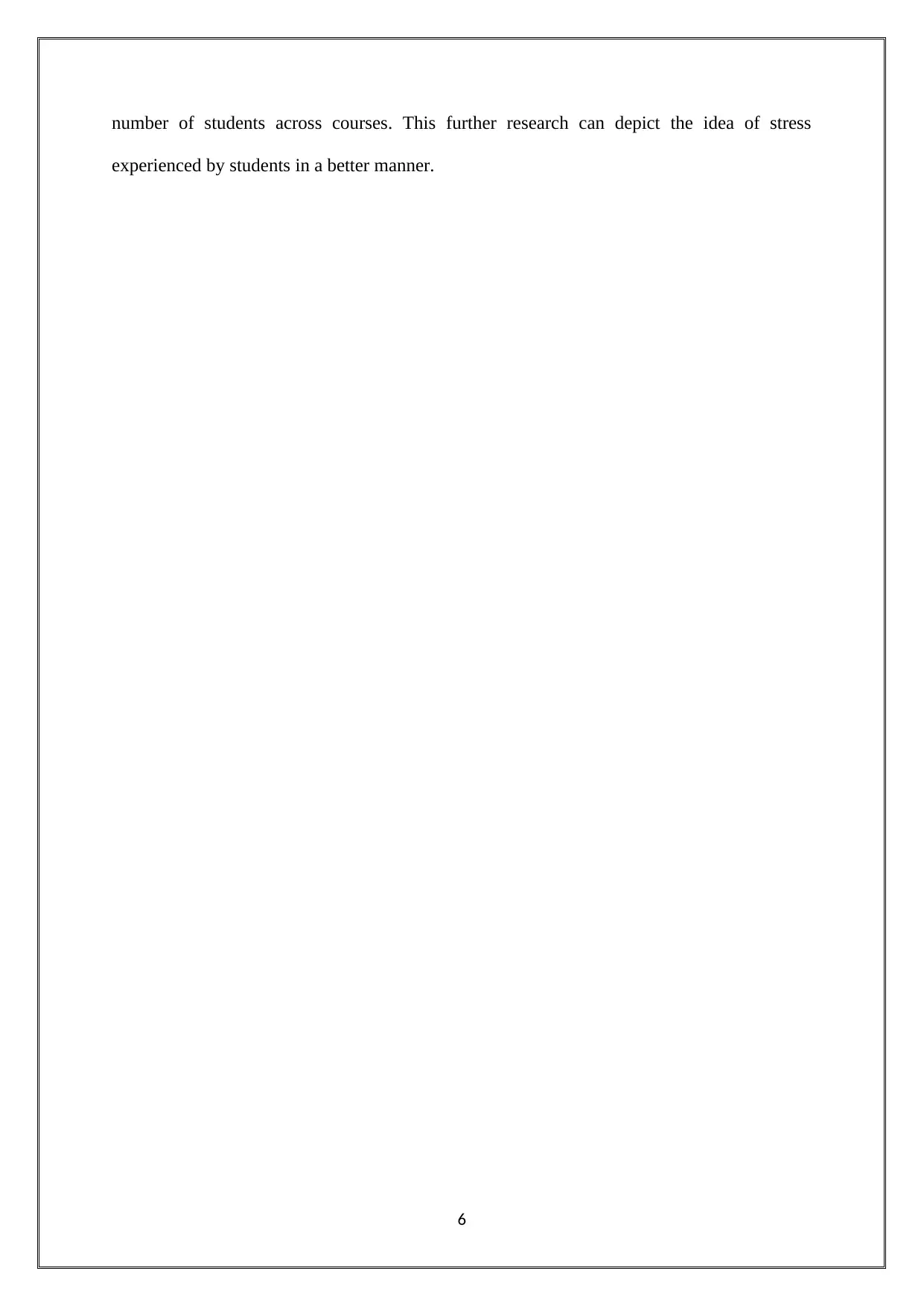
number of students across courses. This further research can depict the idea of stress
experienced by students in a better manner.
6
experienced by students in a better manner.
6
⊘ This is a preview!⊘
Do you want full access?
Subscribe today to unlock all pages.

Trusted by 1+ million students worldwide
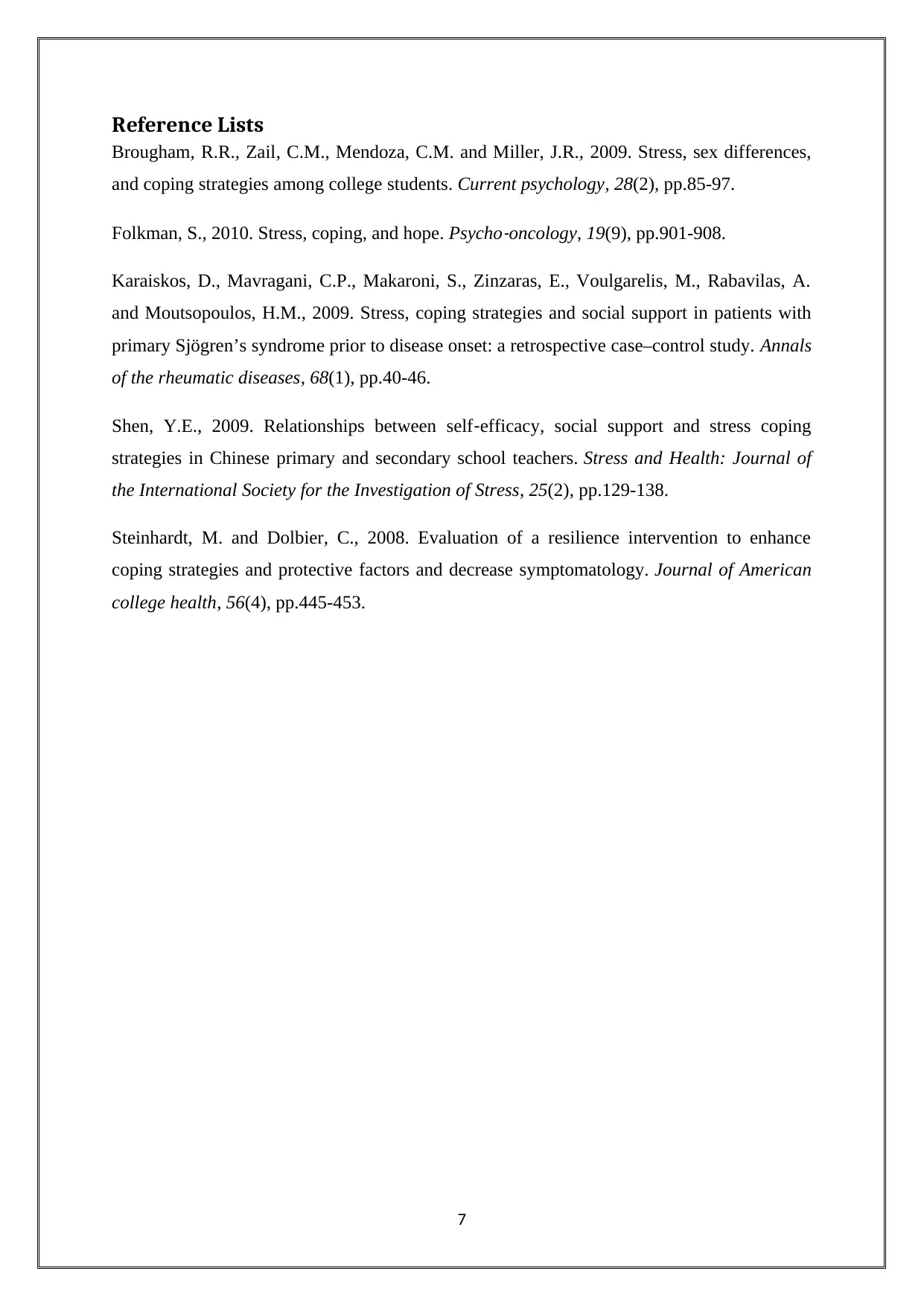
Reference Lists
Brougham, R.R., Zail, C.M., Mendoza, C.M. and Miller, J.R., 2009. Stress, sex differences,
and coping strategies among college students. Current psychology, 28(2), pp.85-97.
Folkman, S., 2010. Stress, coping, and hope. Psycho
‐oncology, 19(9), pp.901-908.
Karaiskos, D., Mavragani, C.P., Makaroni, S., Zinzaras, E., Voulgarelis, M., Rabavilas, A.
and Moutsopoulos, H.M., 2009. Stress, coping strategies and social support in patients with
primary Sjögren’s syndrome prior to disease onset: a retrospective case–control study. Annals
of the rheumatic diseases, 68(1), pp.40-46.
Shen, Y.E., 2009. Relationships between self‐efficacy, social support and stress coping
strategies in Chinese primary and secondary school teachers. Stress and Health: Journal of
the International Society for the Investigation of Stress, 25(2), pp.129-138.
Steinhardt, M. and Dolbier, C., 2008. Evaluation of a resilience intervention to enhance
coping strategies and protective factors and decrease symptomatology. Journal of American
college health, 56(4), pp.445-453.
7
Brougham, R.R., Zail, C.M., Mendoza, C.M. and Miller, J.R., 2009. Stress, sex differences,
and coping strategies among college students. Current psychology, 28(2), pp.85-97.
Folkman, S., 2010. Stress, coping, and hope. Psycho
‐oncology, 19(9), pp.901-908.
Karaiskos, D., Mavragani, C.P., Makaroni, S., Zinzaras, E., Voulgarelis, M., Rabavilas, A.
and Moutsopoulos, H.M., 2009. Stress, coping strategies and social support in patients with
primary Sjögren’s syndrome prior to disease onset: a retrospective case–control study. Annals
of the rheumatic diseases, 68(1), pp.40-46.
Shen, Y.E., 2009. Relationships between self‐efficacy, social support and stress coping
strategies in Chinese primary and secondary school teachers. Stress and Health: Journal of
the International Society for the Investigation of Stress, 25(2), pp.129-138.
Steinhardt, M. and Dolbier, C., 2008. Evaluation of a resilience intervention to enhance
coping strategies and protective factors and decrease symptomatology. Journal of American
college health, 56(4), pp.445-453.
7
1 out of 7
Related Documents
Your All-in-One AI-Powered Toolkit for Academic Success.
+13062052269
info@desklib.com
Available 24*7 on WhatsApp / Email
![[object Object]](/_next/static/media/star-bottom.7253800d.svg)
Unlock your academic potential
Copyright © 2020–2026 A2Z Services. All Rights Reserved. Developed and managed by ZUCOL.





